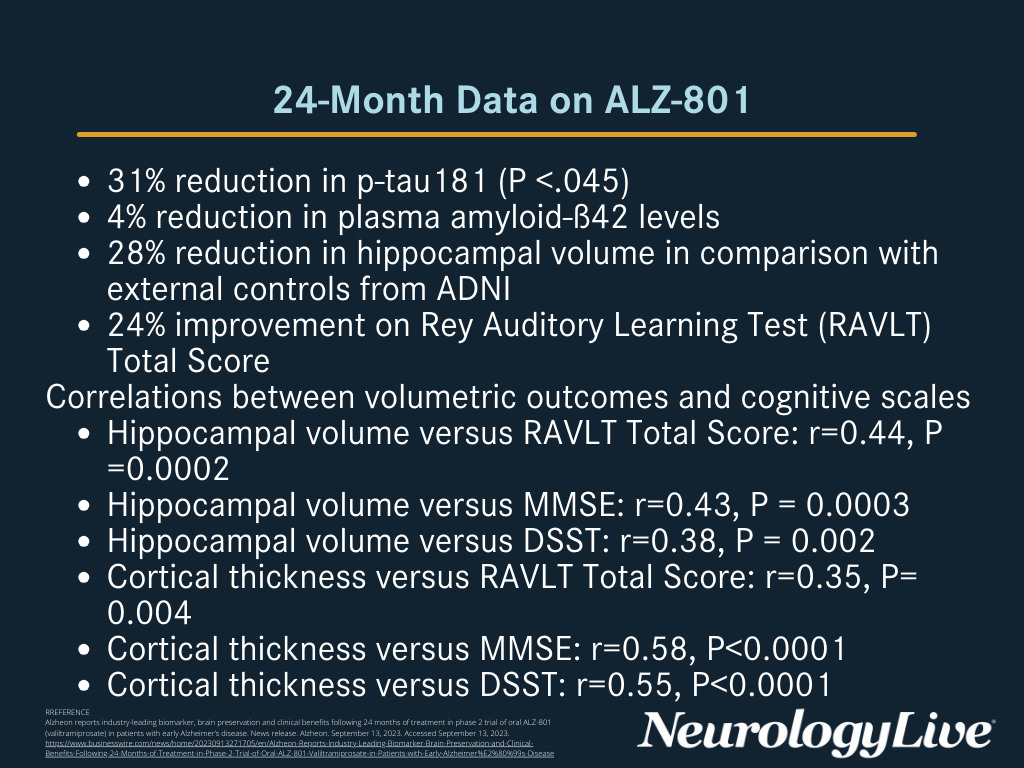News
Article
Alzheimer Agent ALZ-801 Improves Cognition, Reduces Relevant Biomarker Levels in 2-Year Analysis
Author(s):
Over a 2-year treatment period, patients on ALZ-801 demonstrated significant correlations between effects on volumetric MRI outcomes and 3 cognitive scales, suggesting cognitive gains are a result of preservation of brain structures from neurodegeneration and atrophy.
Martin Tolar, MD, PhD

Alzheon, the drug makers of ALZ-801, announced positive topline data from its phase 2 biomarker study (NCT04693520), with findings that showed significant reductions in plasma phosphorylated tau (p-tau) levels and improved cognitive scores after 2 years of treatment with the agent. Patients on ALZ-801 also demonstrated a statistically significant reduction in measures of hippocampal volume in comparison with an external control arm of matched ADNI patients, which were consistent with previously reported 12-month data.
The open-label, single-arm phase 2 trial included 84 patients with early-stage Alzheimer disease (AD) who carried either 1 or 2 copies of the ε4 allele of apolipoprotein E gene (APOE3/4 heterozygotes and APOE4/4 homozygotes, respectively) and were treated over a 104-week period. Treatment with the agent resulted in a statistically significant 43% reduction in plasma p-tau181 (P <.009) after 52 weeks and a 31% reduction at week 104 (P <.045). Plasma amyloid-ß42 levels decreased throughout the treatment period, reaching a statistically significant 4% reduction from baseline (P <.042) at week 104, while the reduction in plasma Aß40 levels stabilized at 52 weeks at a new homeostatic level.
"We are pleased with the growing body of evidence that supports ALZ-801’s potential as the first oral disease modifying therapy for Alzheimer’s disease. The magnitude of p-tau181 biomarker reduction in plasma compared to plaque-clearing anti-amyloid antibodies, combined with preservation of brain hippocampal volume and its strong positive correlations with cognitive benefits, reinforces our conviction that ALZ-801 has the potential to disrupt the Alzheimer’s treatment paradigm by halting the progression of this relentless and debilitating disease," Martin Tolar, MD, PhD, founder, president, and chief executive officer, Alzheon, said in a statement.1 "These efficacy data combined with a favorable safety profile with no events of vasogenic edema underscore the differentiated clinical profile of ALZ-801 oral tablet, and we look forward to further validation of these findings from our ongoing Phase 3 APOLLOE4 trial in APOE4/4 homozygotes that is expected to read out in the third quarter of 2024."
After 104 weeks of treatment, patients showed a statistically significant 28% reduction in hippocampal volume (P <.015) in comparison with external controls from the Alzheimer Disease Neuroimaging Initiative (ADNI). Controls from the ADNI which were matched based on APOE4 genotype, age, gender, and disease stage following FDA guidance from August 2023 on the use of real-world data and real-world evidence to support regulatory decision-making for drugs and biological products.
Patients treated with ALZ-801 demonstrated consistent improvements in Rey Auditory Learning Test (RAVLT) and Digit Symbol Substitution Test (DSST), 2 cognitive scales, after 26 weeks. These improvements remained stable and above baseline through the 104-week treatment period. In comparison with matched ADNI individuals, treated patients showed a statistically significant 24% improvement (P <.0001) on RAVLT Total Score, which combines effects on immediate and delayed recall tests.
John Hey, PhD, chief scientific officer, Alzheon, said in a statement, "The sustained reduction in plasma p-tau181 combined with the decrease in rate of hippocampal atrophy as well as the stabilization of cognition over 2 years is consistent with a disease modifying action in Alzheimer’s patients. These early p-tau181 effects are enabled by the robust 40% brain penetration of ALZ-801 compared to an approximately 1% brain penetration of plaque-clearing anti-amyloid antibodies. As p-tau181 is primarily of brain origin and is actively cleared from brain into plasma, the significant lowering of p-tau181 in response to ALZ-801 treatment validates the drug’s target engagement and mechanism of action in the brain."1

He added, “To put these effects into context, trials with currently approved anti-amyloid antibodies showed a 24-32% reduction in cognitive decline over 1.5 years, while patients treated with ALZ-801 demonstrated cognitive gain from baseline status and maintained their cognitive skills through and beyond same time period. These well-differentiated results position ALZ-801 to potentially become the first oral agent that can slow or even stop and prevent Alzheimer’s pathology in patients and healthy individuals at risk for the disease.”
Additional findings from the study showed significant correlations between effects on volumetric MRI outcomes and 3 cognitive scales, including the Mini-Mental Status Examination (MMSE). These included hippocampal volume vs RAVLT Total Score (r = 0.44; P = .0002), hippocampal volume vs MMSE (r = 0.43; P = .0003), hippocampal volume vs DSST (r = 0.38; P = .002), cortical thickness vs RAVLT Total Score (r = 0.35; P = .004), cortical thickness vs MMSE (r = 0.58; P <.0001) and cortical thickness vs DSST (r = 0.55; P <.0001). Overall, these suggest that cognitive gain and maintenance of cognitive skills are a result of preservation of brain structures from neurodegeneration and atrophy.
"We have developed a differentiated agent in terms of its mechanism of action, which acts upstream on the same pathway as the currently approved anti-amyloid antibodies and that translates to promising and meaningful efficacy, as well as decrease in brain atrophy, easy oral administration and a favorable safety profile that obviates the need for frequent monitoring for brain edema and microhemorrhage," Susan Abushakra, MD, chief medical officer, Alzheon, said in a statement.1 "ALZ-801 tablet is well positioned to become the first oral disease-modifying AD treatment approved for slowing and even halting cognitive decline, and we are very encouraged by these results and the potential for a life-changing impact on the lives of Alzheimer’s patients and their families."
In terms of safety, the agent showed a favorable profile that was consistent with previous observations. All told, there were no amyloid-related imaging abnormalities (ARIA) of vasogenic brain edema, a common issue typically seen in antiamyloid therapies. COVID infection, mild nausea, and decreased appetite were among the most common adverse events, reported in more than 10% of treated patients.
Earlier this year, at the 2023 American Academy of Neurology Annual Meeting, Alzheon presented baseline imaging characteristics from its ongoing phase 3 APOLLOE4 trial (NCT04770220) assessing ALZ-801 in patients with early AD who are carriers of the APOE4 genotype. In the findings, the patient population exhibited a high rate of cerebral amyloid angiopathy (CAA)-related lesions at baseline, making them more susceptible to treatment-induced ARIA of brain edema and microhemorrhage. At the meeting, NeurologyLive® sat down with Hey to discusss the findings, and why ALZ-801 may be more suitable to this patient population.
REFERENCES
1. Alzheon reports industry-leading biomarker, brain preservation and clinical benefits following 24 months of treatment in phase 2 trial of oral ALZ-801 (valiltramiprosate) in patients with early Alzheimer’s disease. News release. Alzheon. September 13, 2023. Accessed September 13, 2023. https://www.businesswire.com/news/home/20230913271705/en/Alzheon-Reports-Industry-Leading-Biomarker-Brain-Preservation-and-Clinical-Benefits-Following-24-Months-of-Treatment-in-Phase-2-Trial-of-Oral-ALZ-801-Valiltramiprosate-in-Patients-with-Early-Alzheimer%E2%80%99s-Disease
2. Alzheon to present baseline imaging characteristics from ongoing APOLLOE4 phase 3 trial of oral tablet ALZ-801 (Valiltramiprosate) and results of phase 2 biomarker study at American Academy of Neurology Conference in Boston. News release. Alzheon. April 18, 2023. Accessed September 13, 2023. https://www.businesswire.com/news/home/20230418005109/en/Alzheon-to-Present-Baseline-Imaging-Characteristics-from-Ongoing-APOLLOE4-Phase-3-Trial-of-Oral-Tablet-ALZ-801-Valiltramiprosate-and-Results-of-Phase-2-Biomarker-Study-at-American-Academy-of-Neurology-Conference-in-Boston
Newsletter
Keep your finger on the pulse of neurology—subscribe to NeurologyLive for expert interviews, new data, and breakthrough treatment updates.




